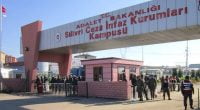Turkish academics exiled to Germany remain in fear

Date posted: September 28, 2017
David Matthews
Mehmet is a Turkish academic who rarely looks directly at you; instead, he turns away and smiles in a pained way. Unlike almost all of the other delegates at a conference for refugee academics being held in Leipzig, he is not wearing a name lanyard that would identify him.
His real name is not Mehmet – he asked Times Higher Education to keep his identity secret, fearing that his relatives back in Turkey would have their homes raided if the state found out that he was talking to journalists in Germany, having fled there and applied for asylum.
Even now, he and other Turkish academics who have escaped increasing repression at home do not feel entirely comfortable. They feel that they are being watched by supporters of Turkey’s president, Recep Tayyip Erdoğan, many of whom live in Germany.
Last year’s failed coup against Turkey’s president Recep Tayyip Erdogan resulted in a crackdown on scholars and universities, and has divided the nation’s diaspora. Intense polarisation of Turkish diaspora, plus online harassment, means refugee scholars feel they are being watched.
In Turkey, Mehmet was formerly a professor at a university founded by supporters of a movement led by the cleric Fethullah Gülen, a long-term exile in Pennsylvania, who fell out with Mr Erdoğan around 2012. The movement is seen by supporters as a relatively liberal Islamic creed focused on education, but detractors see it as a shadowy force attempting to build a secret network inside the Turkish state. Mehmet said that he gave part of his salary to support the movement, although could not decide whether he was a “member” or merely a “sympathiser”.
Then in July last year, a coup attempt was launched that left more than 260 people dead. Fighter planes bombed Turkey’s parliament building and there was a shoot-out as rebels attempted to capture Mr Erdoğan. But it failed after the president’s supporters took to the streets in defiance.
It is probably fair to say that Western journalists are still not completely certain who orchestrated the coup. But Mr Erdoğan blamed the Gülen network, shutting down 15 universities, including Mehmet’s, as well as banning scholars from leaving the country and over the coming months dismissing thousands of academics on suspicion of being involved in the Gülen movement and the coup, according to the Scholars at Risk network. These academics were banned from seeking other academic positions, while their passports and those of their spouses were cancelled.
Mehmet managed to leave before being caught in this net. After the coup attempt, with news mounting of the jailing and torture of Gülen supporters, “I just decided to leave the country as fast as possible,” he said.
Via stays with friends in Bosnia and Iraq, and Nigeria, where he could stay with no visa, Mehmet eventually made it to Germany (he said he had to avoid using Turkish Airlines for fear of being snatched). Now he is waiting on an asylum decision, having applied a fortnight ago.
But even in Germany, his unease persists. About 4 million people of Turkish descent live in Germany, originally brought in as “guest workers” during the West German economic boom of the 1960s, and cleavages in Turkish society have spread to the diaspora. Many German commentators were shocked when a majority of Turkish voters in Germany cast their ballots earlier this year in favour of even further autocratic powers for Mr Erdoğan. Recent diplomatic spats between the two countries have made tensions even higher.
“I feel safe, but whenever I get in touch with Turkish people here…I feel a bit, not comfortable,” said Mehmet. They will ask whether he had a problem with the government, he explained.
For example, Mehmet recently met an eBay seller, a Turkish man who had lived in Germany for 27 years, to buy a bicycle. One of the first questions he asked Mehmet was: “are you close to the guy in America?” – meaning Gülen. When it became clear that Mehmet was a Gülen sympathiser, the bike seller became hostile. Although Mehmet said that he managed to soften his opinions somewhat during the lengthy conversation that followed, he was told never to tell anyone that they had spoken.
Another Gülen movement supporter, who helps those who have fled, including academics, told THE that since the coup attempt, hostility from some Turks in Germany had grown significantly. Friends of 20 years standing now believe that he is a terrorist, he said (Turkey has designated the Gülen movement as a terrorist organisation).
He said that many Gülenists have had to stop going to Ditib mosques, a network that serves those with a Turkish background in Germany. The German government has accused Ditib mosques of being under Ankara’s influence, and in February, German police raided the apartments of four Ditib imams accused of spying on Gülen supporters in Germany. He said he has been forced to find another mosque.
The long arm of Turkish influence can reach refugee academics in Germany in other ways too. Ekrem Düzen, who left Turkey for Germany last summer, said that he believes his and many of his fellow academics’ social media accounts are being watched. They have received direct and indirect messages and comments pointing out that their academic friends in Turkey had been fired, threatened, harassed, and even detained, he said – the clear implication is that they should keep a low profile.
Dr Düzen was fired at the beginning of 2016 in the first wave of dismissals of academics who had signed a letter urging the Turkish government to cease military operations against Kurdish towns and neighbourhoods. These “academics for peace” were mainly liberals, social democrats and leftists, he said, who have for years been trying to make clear the dividing line between them and the Gülenists, whom he calls “antidemocratic”. But after the coup, the government made the “political play” of mixing up these two groups in lists of targeted academics.
Now a researcher on conflict and violence at Bielefeld University in northwestern Germany, Dr Düzen said that although he has not received any direct threats, the political polarisation in Turkey has spread to Germany, and government sympathisers both in Turkey and abroad believe that people like him are enemies of the Turkish state.
“The Turkish government mobilises people here,” Dr Düzen said. You “never know” if you are safe, even in Germany, he continued. “We know that we are telling the truth and we continue to do so.”
Source: Times Higher Education , September 27, 2017
Tags: Education | Europe | Germany | Persecution of Hizmet by Erdogan |
























